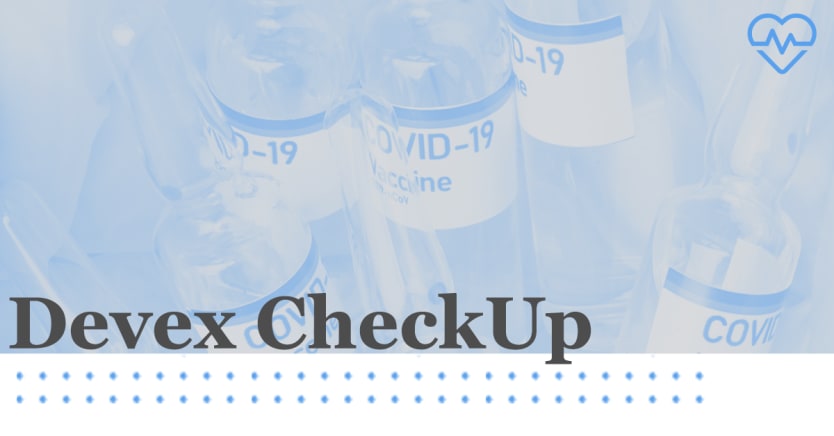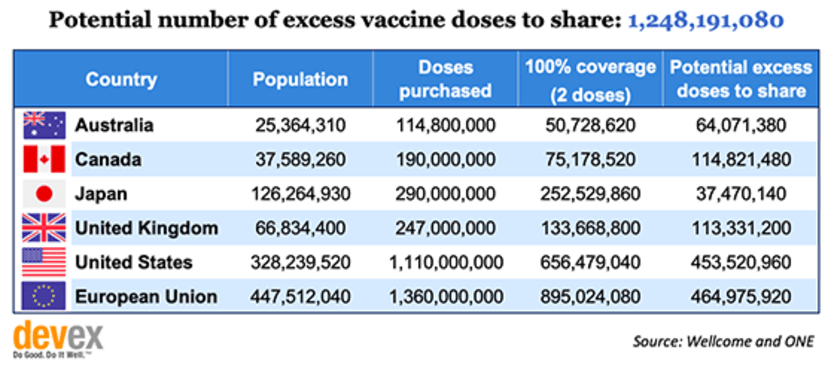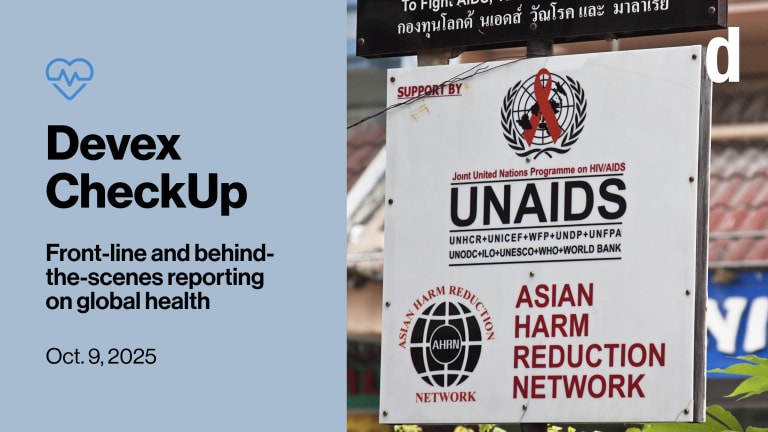Devex CheckUp: Will the G-7 deliver on vaccine sharing and funding?

What do Nobel prize winners and Alyssa Milano have in common? More than you’d think: Over 15 Nobel laureates from the U.K., along with Milano and other celebs such as Mark Ruffalo and Stephen Fry, urged world leaders to support the IP waiver for COVID-19 vaccines at the WTO TRIPS council meeting held this week. But did it work?
Short answer: Yes. At the end of the two-day meeting, delegates agreed to move to the next step of the process: A text-based discussion aiming to create a draft that satisfies all of the different constituencies in the consensus-based WTO, Andrew Green reports. All eyes will be on the EU and the U.K., which have so far resisted the proposal.
At the three-day G-7 meeting starting tomorrow in Cornwall — the first major gathering of the world’s most powerful nations since the pandemic hit — pressure will be on how to “lead the way to vaccinate the world,” as U.K. Prime Minister Boris Johnson puts it. Civil society groups have also called for a G-7 Vaccine Emergency Task Force that would ensure equitable and fast access to vaccines worldwide.
This is a preview of Devex CheckUp
Sign up to this newsletter for exclusive global health news and insider insights, in your inbox every Thursday.
But the U.K.’s leadership image is marred by its recent aid cuts which experts think leads to a “framing issue,” giving the impression that it is “not connecting all the dots … in terms of pandemic response and preparedness,” Will Worley reports.
Ahead of the talks, the U.S. is reportedly planning to buy 500 million doses of Pfizer’s COVID-19 vaccine to donate to COVAX.
Only two countries in the G-7 — Germany and Canada — have contributed their full share of funding to the ACT-Accelerator, Sara Jerving reports. That has left the collaboration $18.1 billion underfunded and hindered the distribution of personal protective equipment, diagnostics, therapeutics, and oxygen needed to control the pandemic.
+ A new special report for Pro subscribers launches in 5 days. Register your interest to learn how globaldev organizations are using social media for outreach and fundraising.
Female trouble
Women in low-resource settings have always had limited access to cervical cancer screenings and have paid a heavy price for it. More than 85% of deaths globally from the disease occur in low- and middle-income countries. The pandemic has made a bad situation worse, as health service providers can’t host community screenings and fundraising drives have stalled. Severe cuts to the U.K. aid budget are also expected to set back efforts for years to come, Sara reports.
In Zimbabwe, an Amnesty International report shows that women and girls continue to risk childbirth injuries like obstetric fistula by choosing home-based deliveries over health care facilities, Rumbi Chakamba reports. Nearly one-quarter of women give birth without skilled assistance, as religious and cultural practices often show strong preferences for home birth and economic constraints limit access to formal medical care.
Fair share

Ask the expert
On Wednesday, Amruta will be in conversation with Dr. Soumya Swaminathan,
Chief Scientist at WHO to talk about how governments can prepare for new waves of COVID-19 amid new variants, vaccine hesitancy, and what’s in store for therapeutics. Register for the event.
By the numbers
WHO recently released its World Health Statistics report for 2021, which analyzes more than 50 health-related indicators for the Sustainable Development Goals and WHO’s “triple billion” targets.
Here are five things that stood out for us:
• There are an estimated 1.2 million more “excess deaths” both directly and indirectly attributed to COVID-19 than have been formally counted as part of the pandemic's toll.
• Only about half of countries surveyed had disaggregated health data — an essential tool for identifying health inequalities.
Your next job?
Director, Programs, Global Vaccines Delivery
Clinton Health Access Initiative
Remote position
• Low-income countries showed the greatest improvements in life expectancy between 2000 and 2019, gaining an average of 11 years. High-income countries gained just 3.2 years, though it’s still 15 years longer than that of low-income countries.
• The global share of deaths from noncommunicable diseases shot up from 61% in 2000 to nearly 74% in 2019.
• About 40% of the world’s deaths remain unregistered, and just 27% of countries were found to have the capacity to monitor public health threats.
What we’re reading
A trial that infected mosquitoes with bacteria found that it reduced their ability to spread dengue fever by 77%. [BBC]
Haiti is the only country in the Western hemisphere that is yet to receive or administer a single dose of COVID-19 vaccine. [Bloomberg]
Though more than half the population of Mongolia is vaccinated, largely with China’s Sinopharm, COVID-19 cases have risen more than 70% in the past two weeks. [New York Times]
Search for articles
Most Read
- 1
- 2
- 3
- 4
- 5









